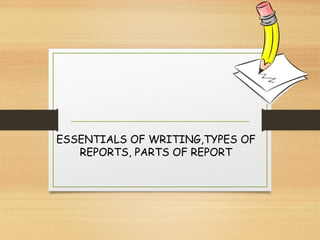
Report Writing1..
- 1. ESSENTIALS OF WRITING,TYPES OF REPORTS, PARTS OF REPORT
- 2. Rationale • The ability to write a good report can make or break a case. • A report that a police officer writes in his squad car has the potential to make it to the United States Supreme Court.
- 3. Objectives The student will be able to: 1. Define the different types of reports and their functions. 2. Identify what makes a good police report. 3. Investigate a burglary case and write a report on it. 4. Compose a report on an aggravated robbery case as part of a multiple choice test.
- 4. Key Points
- 5. I. Observation • An important skill in law enforcement. • The better an officer observes things, the better he or she can describe them
- 6. II. The purpose of reports in law enforcement A. They provide a source of information while police carry out an investigation 1. Allows passing of the case from one officer to another 2. Provides a factual record of the work done on a case, eliminating duplication 3. Is a requisite for the proper preparation and presentation of a case to the district attorney and to the court
- 7. B. Helps a department stay organized 1. The memory system of a department 2. Serves as a written, permanent record of all department business
- 8. Most official forms of communication are completed using reports. C. A report is an administrative necessity:-
- 9. D. Other purposes 1. The basis for maintenance of identification and criminal records in Austin 2. Aid in the recovery of lost or stolen property 3. Contain information used to apprehend criminals 4. Used in civil suits 5. Provide factual data to combat ill-advised or unreasonable demands on police 6. Furnish information to the news media
- 10. III. Parts of reports
- 11. A. Initial reports – can begin in the squad car and end up in the Supreme Court 1. Arrest reports 2. Incident reports – for documentation purposes only 3. Offense reports – begin the investigation of criminal matters 4. Initial reports – written by the assigned officer, covering the initial investigation, and lay the foundation for the whole case
- 12. B. Supplemental reports 1. All reports other than the initial report 2. Written by an officer, other than the one assigned, about his or her participation in a particular case 3. Concerned with follow-up work performed by inspectors, detectives, or investigators 4. Submitted in connection with the investigation by specialists such as fingerprint technicians, photographers, drug lab analysts, etc.
- 13. C. Attachments to reports including crime scene photos and sketches, notes, and other documents filed with the case report
- 14. Four requisites of a good report A. Factual – detailed correctness B. Clear – distinct and unconfused C. Complete – having no deficiency D. Concise – expressing much in a few words
- 15. Questions to ask and answer A. Who? B. What? C. When? D. Where? E. Why? F. How?
- 16. Essential components of a report A. Date B. Time C. Location D. Kind of call E. Description of surroundings F. Description of vehicle G. Description of suspect H. Chronological order
- 17. D. Burglary information 1. How the suspect entered the home a. Home accessible (unlocked) b. Forced entry c. Inside job 2. How the suspect left the home
- 18. Thank you For Your Attention Presented By: SHUBHAM YADAV
